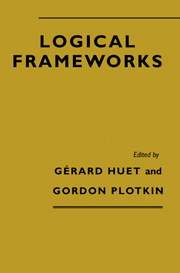Encoding dependent types in an intuitionistic logic
from Representing Formal Systems
Published online by Cambridge University Press: 04 August 2010
Summary
Abstract
Various languages have been proposed as specification languages for representing a wide variety of logics. The development of typed λ-calculi has been one approach toward this goal. The logical framework (LF), a λ-calculus with dependent types is one example of such a language. A small subset of intuitionistic logic with quantification over the simply typed λ-calculus has also been proposed as a framework for specifying general logics. The logic of hereditary Harrop formulas with quantification at all non-predicate types, denoted here as hhw, is such a meta-logic. In this paper, we show how to translate specifications in LF into hhw specifications in a direct and natural way, so that correct typing in LF corresponds to intuitionistic provability in hhw. In addition, we demonstrate a direct correspondence between proofs in these two systems. The logic of hhw can be implemented using such logic programming techniques as providing operational interpretations to the connectives and implementing unification on λ-terms. As a result, relating these two languages makes it possible to provide direct implementations of proof checkers and theorem provers for logics specified in LF.
Introduction
The design of languages that can express a wide variety of logics has been the focus of much recent work. Such languages attempt to provide a general theory of inference systems that captures uniformities across different logics, so that they can be exploited in implementing theorem provers and proof systems.
- Type
- Chapter
- Information
- Logical Frameworks , pp. 215 - 252Publisher: Cambridge University PressPrint publication year: 1991
- 4
- Cited by



